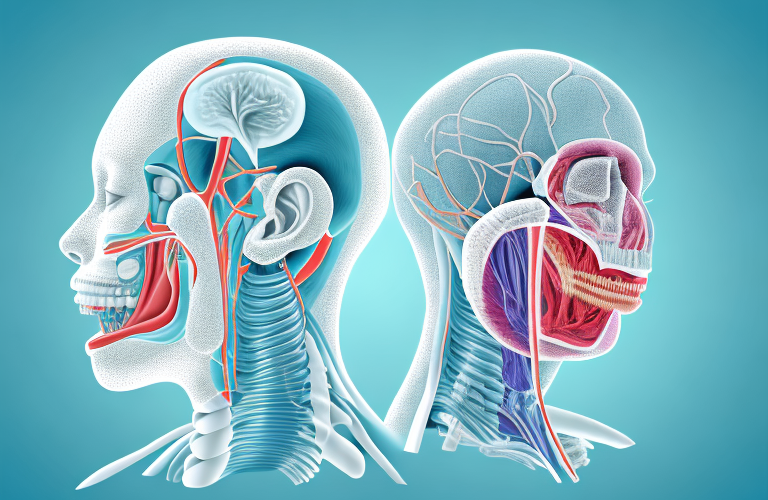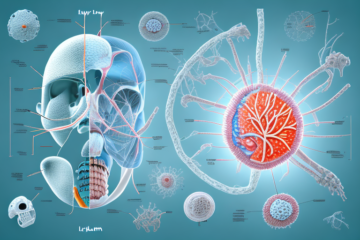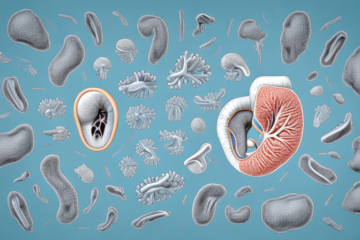Tonsils are an important part of the immune system, located at the back of the throat. They are a group of small, round, pinkish-red tissues that play a crucial role in protecting the body from infections. The tonsils are a part of the lymphatic system, which fights against harmful substances and infections that may enter the body. In this article, we will delve deeper into the function and anatomy of tonsils, the different types of tonsils, how they work as a part of the immune system, and the various conditions and treatments associated with tonsils.
The Basics of Tonsils: What Are They and What Do They Do?
Tonsils are specialized tissues that help to protect the body from infection by trapping germs and other harmful substances that enter the mouth and throat. They also produce antibodies that help to fight off infections. Essentially, tonsils act as a filter for the immune system, removing pathogens before they can enter the body and cause harm. However, tonsils can also become a site of infection themselves, leading to conditions like tonsillitis.
In addition to their role in protecting the body from infection, tonsils also play a role in the development of the immune system. Studies have shown that removal of the tonsils can lead to an increased risk of certain infections and autoimmune disorders. However, in some cases, removal of the tonsils may be necessary to treat chronic or severe tonsillitis or other conditions. It is important to consult with a healthcare provider to determine the best course of action for individual cases.
Understanding the Anatomy of Tonsils: Where Are They Located in the Body?
Tonsils are located at the back and sides of the throat, just beyond the tongue. The tonsils are two soft masses of tissue, one on either side of the throat, known as the palatine tonsils. There are also two other types of tonsils, the pharyngeal tonsil (adenoids) located behind the nasal passage, the tubal tonsils surrounding the opening of the eustachian tube in the back of the throat and the lingual tonsils situated at the base of the tongue. All tonsils consist of lymphoid tissue which contains cells responsible for fighting off infections.
The tonsils play an important role in the body’s immune system, as they act as the first line of defense against harmful pathogens that enter the body through the mouth and nose. When the tonsils detect the presence of these pathogens, they produce antibodies to fight them off and prevent them from causing infections. However, in some cases, the tonsils themselves can become infected and inflamed, leading to conditions such as tonsillitis. In severe cases, the tonsils may need to be surgically removed to prevent further complications.
The Different Types of Tonsils: Palatine, Lingual, Pharyngeal, and Tubal
The palatine tonsils, or the tonsils that most people refer to when they talk about tonsils, are located at the back of the throat on each side of the uvula. Lingual tonsils are located under the tongue at the back of the mouth. The pharyngeal tonsils, or adenoids, are located higher up in the throat behind the nose. Tubal tonsils are located around the eustachian tube. Each type of tonsil plays a slightly different role in defending the body from infection.
The palatine tonsils are the most commonly removed tonsils in tonsillectomy surgeries. They are responsible for fighting off bacteria and viruses that enter the body through the mouth and nose. Lingual tonsils, on the other hand, are not as well-known and are often overlooked. They are responsible for protecting the body from infections that enter through the mouth. The pharyngeal tonsils, or adenoids, are part of the body’s immune system and help to fight off infections that enter through the nose and mouth. Tubal tonsils are located near the opening of the eustachian tube and help to protect the middle ear from infections.
How Do Tonsils Work as Part of the Immune System?
Tonsils are a part of the immune system, specifically the lymphatic system. Whenever pathogens such as bacteria, viruses, and other harmful substances enter the body, the tonsils are one of the first lines of defense. They trap these substances in the tonsillar crypts, where specialized immune cells called lymphocytes attack and destroy them. Tonsils also help in the development of immunity to future infections by producing antibodies against the pathogens they encounter.
In addition to their role in fighting infections, tonsils also play a crucial role in the development of speech and language in children. The tonsils are located near the base of the tongue and the back of the throat, and they help to shape the sounds that we make when we speak. In some cases, enlarged tonsils can lead to speech problems and difficulty swallowing.
However, in rare cases, tonsils can become infected and inflamed, leading to a condition known as tonsillitis. Symptoms of tonsillitis include sore throat, difficulty swallowing, fever, and swollen lymph nodes. In severe cases, tonsillitis may require treatment with antibiotics or even surgery to remove the tonsils.
What Happens When Your Tonsils Become Infected or Inflamed?
When the tonsils encounter an infection or pathogen, they can become inflamed, red, and swollen. This condition is known as tonsillitis. Tonsillitis can be caused by viruses, bacteria, or other harmful substances that enter the body. The symptoms of tonsillitis include a sore throat, fever, swollen lymph nodes, and difficulty swallowing. Tonsillitis can be treated with various home remedies and medical interventions, depending on the severity of the infection.
If left untreated, tonsillitis can lead to complications such as abscesses, difficulty breathing, and the spread of infection to other parts of the body. In severe cases, a tonsillectomy may be necessary to remove the infected tonsils. It is important to seek medical attention if you experience symptoms of tonsillitis, especially if they persist or worsen over time.
The Link Between Tonsillitis and Streptococcal Infections
One of the most common causes of tonsillitis is a bacterial infection from a type of bacteria known as streptococcus. Streptococcal infections are highly contagious and can lead to serious complications if left untreated. If you suspect that you have a streptococcal infection or tonsillitis, it is highly recommended that you seek medical attention as soon as possible to avoid any complications.
Streptococcal infections can also cause other health problems besides tonsillitis. For example, streptococcus bacteria can cause skin infections, pneumonia, and even meningitis. It is important to be aware of the symptoms of these infections and seek medical attention if you suspect that you may have been exposed to streptococcus bacteria.
Preventing the spread of streptococcal infections is crucial in avoiding complications. This can be done by practicing good hygiene, such as washing your hands regularly and covering your mouth and nose when coughing or sneezing. Additionally, avoiding close contact with individuals who have a streptococcal infection can also help prevent the spread of the bacteria.
Symptoms of Tonsillitis: Sore Throat, Difficulty Swallowing, and More
The symptoms of tonsillitis can vary depending on the type of infection and the severity of the condition. The most common symptoms include a sore throat, difficulty swallowing, fever, swollen tonsils, swollen lymph nodes, and a headache. If you experience any of these symptoms, it is essential to seek medical attention to avoid any complications.
In addition to the common symptoms mentioned above, some people may also experience bad breath, ear pain, and a stiff neck. These symptoms can indicate a more severe case of tonsillitis and should be addressed promptly by a healthcare professional.
It is important to note that tonsillitis is contagious and can be spread through contact with an infected person’s saliva or nasal secretions. To prevent the spread of tonsillitis, it is recommended to practice good hygiene, such as washing your hands frequently and avoiding close contact with others who are sick.
How to Treat Tonsillitis Naturally: Home Remedies and Self-Care Tips
Home remedies and self-care tips can be incredibly useful in treating mild tonsillitis. Drinking plenty of fluids, getting enough rest, and avoiding foods that can irritate the throat can help to speed up recovery. Gargling with warm salt water and drinking warm beverages can also help to soothe the throat and reduce inflammation. However, it is essential to consult a doctor before trying any home remedies, especially if you have a severe infection.
In addition to the above-mentioned remedies, there are several other natural treatments that can help alleviate the symptoms of tonsillitis. One such remedy is honey, which has antibacterial properties and can help to soothe the throat. You can mix honey with warm water or tea and drink it several times a day to reduce inflammation and pain.
Another effective remedy is the use of essential oils. Oils such as peppermint, eucalyptus, and tea tree oil have antimicrobial properties and can help to reduce inflammation and pain. You can add a few drops of these oils to a diffuser or humidifier and inhale the steam to help clear the airways and reduce congestion.
Antibiotics and Other Medical Treatments for Tonsillitis
In some cases, medication may be needed to treat tonsillitis, especially if the infection is caused by bacteria. Antibiotics are the most common treatment for bacterial tonsillitis. Other medications, such as pain relievers or anti-inflammatory drugs, may be prescribed to alleviate symptoms like sore throat and fever. In severe cases or chronic tonsillitis, surgical removal of the tonsils may be necessary.
It is important to note that antibiotics are only effective in treating bacterial tonsillitis, and will not work for viral tonsillitis. In cases of viral tonsillitis, rest and home remedies such as gargling with salt water or drinking warm liquids may be recommended to help alleviate symptoms.
It is also important to follow the prescribed medication regimen and finish the entire course of antibiotics, even if symptoms improve before the medication is finished. Failure to do so can lead to antibiotic resistance and make future infections more difficult to treat.
When Is Surgery Necessary to Remove Tonsils?
If a severe or chronic condition of the tonsils persists, surgical removal may be necessary. Tonsillectomy is a procedure that involves the removal of the tonsils and is usually done on an outpatient basis. Tonsillectomy is often recommended for patients who experience frequent bouts of tonsillitis or sleep apnea caused by enlarged tonsils. The decision to undergo tonsillectomy should be made in consultation with your doctor.
It is important to note that tonsillectomy is not always the first line of treatment for tonsil-related conditions. In some cases, antibiotics or other medications may be prescribed to alleviate symptoms and improve the condition of the tonsils. Additionally, there are certain risks associated with tonsillectomy, such as bleeding and infection, which should be discussed with your doctor prior to the procedure.
After undergoing tonsillectomy, patients may experience some discomfort and difficulty swallowing for a few days. It is important to follow your doctor’s post-operative instructions carefully to ensure proper healing and minimize the risk of complications. In most cases, patients are able to resume normal activities within a week or two after the procedure.
Recovery After Tonsillectomy: What to Expect and How to Speed Up Healing
Recovery after tonsillectomy can vary from person to person, but typically, it takes about 10 to 14 days for full recovery. During this time, it is essential to get plenty of rest, stay hydrated, and avoid foods that can irritate the throat. Your doctor may also prescribe pain relievers or other medications to alleviate discomfort. It is crucial to follow your doctor’s instructions carefully to ensure a speedy and safe recovery.
In addition to rest and hydration, there are several other things you can do to speed up the healing process after a tonsillectomy. One of the most important is to avoid smoking or being around secondhand smoke, as this can irritate the throat and slow down healing. You should also avoid strenuous physical activity or heavy lifting for at least a week after surgery, as this can increase the risk of bleeding.
Another helpful tip is to eat soft, cool foods that are easy to swallow, such as yogurt, ice cream, and smoothies. Avoid hot, spicy, or acidic foods, as these can irritate the throat and cause discomfort. Drinking plenty of water and other fluids can also help keep the throat moist and reduce pain and inflammation.
Complications of Tonsillectomy: Risks and Precautions
Tonsillectomy is a relatively safe procedure, but like any surgical procedure, it carries some risks. Some possible complications of tonsillectomy include bleeding, infection, and complications with anesthesia. It is essential to consult with your doctor beforehand to discuss any risks and precautions associated with the procedure.
One potential complication of tonsillectomy is a condition called velopharyngeal insufficiency, which can cause difficulty with speech and swallowing. This occurs when the muscles in the back of the throat are weakened, leading to air escaping through the nose during speech or difficulty swallowing food or liquids. Your doctor will monitor you for this condition after the procedure and may recommend speech therapy or other treatments if necessary.
Another possible complication of tonsillectomy is a delayed reaction to anesthesia, which can occur hours or even days after the procedure. Symptoms may include confusion, agitation, and difficulty breathing. If you experience any of these symptoms, it is important to seek medical attention immediately.
Common Questions About Tonsils Answered: Do You Really Need Them?
While tonsils are an essential part of the immune system, their removal typically doesn’t cause any significant negative effects on the body’s overall health. In fact, tonsillectomy is one of the most common surgeries performed on children. However, it is important to remember that tonsils play a vital role in protecting the body from infection, and their removal should only be considered in cases where other treatments have failed or the condition is chronic.
In conclusion, tonsils play an essential role in protecting the body from harmful substances and infections. While they can cause conditions like tonsillitis and require removal in some cases, they are an important part of the immune system that helps to defend the body from harm. It is essential to seek medical attention if you experience any symptoms of tonsillitis or other related conditions to ensure proper diagnosis and treatment.
It is also important to note that the size and shape of tonsils can vary from person to person. Some individuals may have larger tonsils that are more prone to infection, while others may have smaller tonsils that rarely cause any issues. Additionally, certain lifestyle factors such as smoking and exposure to pollutants can increase the risk of tonsil-related conditions. Therefore, it is important to maintain a healthy lifestyle and seek medical attention if you experience any symptoms related to your tonsils.










